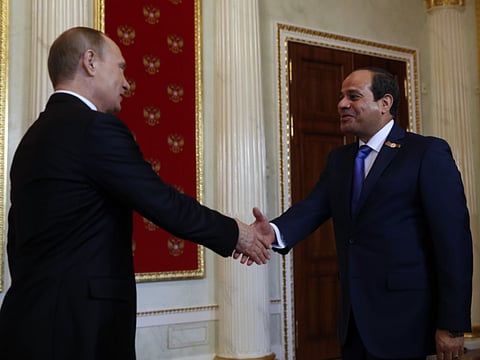Blossoming Egypt-Russia ties
The Egyptian leadership stands to gain from a relationship with Russia

Since the collapse of the Muslim Brotherhood government in Cairo in July 2013, Egypt-Russia relations have been improving at a steady pace. Bilateral relations between Moscow and Cairo are indeed at their highest point in more than 40 years, when former Egyptian president Anwar Sadat decided to end two decades of Cold War alliance by expelling the Soviet military experts shortly before the 1973 Arab-Israel war. Over the past two years, General Abdul Fattah Al Sissi paid four visits to Moscow, the latest was last week, when he attended the Victory Day parade in Moscow, which commemorated the 70th anniversary of Soviet victory over Nazi Germany and the end of the Second World War in Europe. Russia was Al Sissi’s first foreign destination after he was sworn in as President in June 2014. Last February, Russian President Vladimir Putin returned the visit to Cairo, his first in ten years.
The development of Russian-Egyptian relations is of particular importance to Moscow, given the geographic and geopolitical importance of Egypt, which lies at the crossroads of two continents and controls one of the world’s most sensitive shipping lanes. Indeed, retaining strong political ties with Egypt, which remains a leading Arab country, would allow Russia to regain some of its Soviet-era prestige. This has added importance, given the deterioration of Moscow’s relations with the West and its subsequent need for influential partners in the international arena.
Winning over some of Washington’s major allies in the Middle East would also represent a big success for Russia’s new active diplomacy. The strengthening of ties between Putin’s Russia and Al Sissi’s Egypt means that Russia is vying for power with Washington in a region that has for long been a US domain of influence. This would also provide Moscow with an opportune moment to leverage a warming of US-Iranian relations.
Likewise, the Egyptian leadership stands to gain from a relationship with Russia, given that it now faces the prospect of decreasing American financial and military aid. The events of the “Arab Spring”, which provides the backdrop of the warming of Moscow-Cairo relations, did not contribute to solving Egypt’s numerous problems. On the contrary, the fall of the old regime provoked a fierce internal struggle. Al Sissi tried to overcome some of these problems by approaching Russia, seeking to serve a wide range of interests, covering defence, energy and food security. Indeed, Russia has always been willing to compensate for the cuts in American military supplies to Egypt. Last year, Russia jumped at the chance to grab a bigger share of the Egyptian arms market after the US suspended some of its weapons deliveries in the wake of the fall of the government of former president Mohammad Mursi.
No less important are the trade relations between the two countries, which increased 80 per cent in volume in 2013-2014. Increased bilateral ties have also contributed to better food security for both countries. The Egyptian agricultural sector has supplied Russia with fruit and vegetables, allowing the country to circumnavigate European sanctions, while Russia provides Egypt with 40 per cent of the wheat it needs. Nonetheless, energy remains the area in which Russian support is urgently needed by Egypt.
Crucial tests
Egypt expects to meet its energy requirements with the help of Russian nuclear energy: While Russia has already agreed to build a nuclear power plant in Egypt, Cairo aspires to create a full-fledged nuclear power industry within its borders. Unlike the heyday of the Cold War era, Cairo will not, however, look to Moscow for funding of these energy projects. Yet, one of the crucial tests which the blossoming of ties between Egypt and Russia face is the external pressures, coming from within Egypt’s geopolitical neighbourhood, and domestic factors, which are destabilising the country. Without domestic political stability Egypt will be unable to realise better bilateral ties with Russia.
Externally, two cases show how Egypt’s commitments in its neighbourhood are straining its relationship with Russia: Libya and Yemen. While Al Sissi has openly suggested that the Russian Navy could participate in the blockade of “radical Islamists” in Libya, Russia clearly has no appetite to be involved to such an extent, even if alongside its partners. In Yemen, Russia and Egypt do not seem to be in agreement over the crisis in the southern Arabian Peninsula country. While Egypt supports Saudi Arabia in its military operation to prevent Iran and its local allies from dominating the country and thereby threatening Saudi Arabia’s national security, Moscow seems closer to the position of Iran and its Yemeni allies. So far, these factors and several others do not seem strong enough to hinder the development of relations between the two countries, though these will indeed put certain limits to them.
Dr Marwan Kabalan is a Syrian academic and writer.


